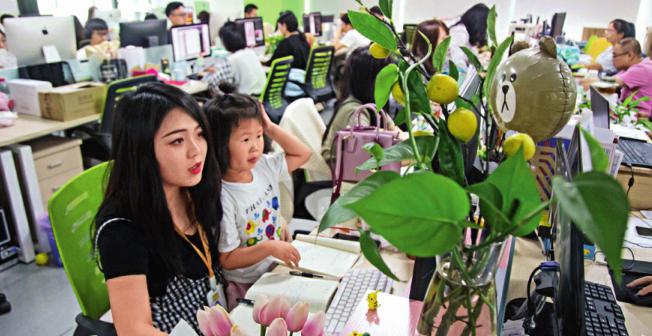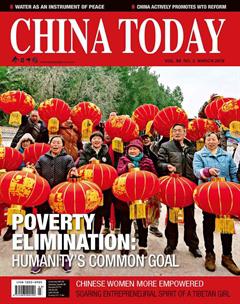Chinese Women More Empowered
By YING CHEN

THE patriarchal concept of “men are superior to women” was deeply rooted in Chinas past. After the founding of the Peoples Republic of China, Chairman Mao Zedong made the now famous saying that“women can hold up half the sky,” which helped to advance the protection of legal rights for women. In the wake of the reform and opening-up policy, women have been deeply involved in social development, and gained unprecedented opportunities to improve their lives.
The female population of China has reached 660 million. At the 2015 Global Summit of Women in New York, President Xi Jinping reiterated Chinas commitment made at the 1995 World Conference on Women in Beijing, to speed up efforts to promote gender equality and womens all-round development.
It was also from 1995 that the Chinese government promulgated the Outline Program for Development of Chinese Women, aiming to promote womens all-round development for three times within the limit of 5 and 10 years. The government implemented the basic national policy of gender equality, guided and promoted the all-round and healthy development of Chinese women in the fields of health, education, economy, participation in decision-making and management, social security, environment, and law. This development path corresponded to the Convention on the Elimination of All Forms of Discrimination against Women adopted by the United Nations on December 18, 1979. As one of the earliest contracting states, China reports to the United Nations every five years on the completion of goals set by the Convention.
Legal Protection for Females
As early as 1992, China promulgated the first basic law on womens rights and interests, the Law of the Peoples Republic of China on the Protection of Rights and Interests of Women, which guarantees girls right to education, womens employment rights and rights to labor protection, rural womens right to contractual management of land and right to distribute income of rural collective economic organizations, womens ownership of joint property in marriage and family and right to inherit property, becoming the institutional guarantee of promoting equality between men and women.
“Independent legislation to protect womens rights and interests is rare in the world,” Weng Wenlei, vice president of Shanghai Womens Federation, noted. After the promulgation of the Law of the Peoples Republic of China on the Protection of Rights and Interests of Women, a series of laws and regulations for the protection of womens rights and interests were promulgated.“This legal system for the protection of womens rights and the promotion of gender equality has played a decisive role in the implementation and maintenance of womens rights and interests,”said Weng Wenlei.
In 2005, the Standing Committee of the National Peoples Congress amended the Law of the Peoples Republic of China on the Protection of Rights and Interests of Women and incorporated gender equality as a basic national policy into the law.
If the legal system of safeguarding womens rights and promoting gender equality has constructed a safety net for women, then the Anti-Domestic Violence Law of the Peoples Republic of China, which was formally implemented in 2016, will undoubtedly make the legal system more complete and effective. There are many highlights in this law, such as the mandatory reporting system, compulsory resettlement system, and warning note system. The establishment of the system of personal security protective order is also a major breakthrough brought about by this law.
Weng Wenlei said the Womens Federation has been promoting the antidomestic violence legislation for more than 20 years. “Many people think that if there is a case of domestic violence, we have the Criminal Law to protect the victim, but family issues are private issues. In our practical work, 90 percent of the victims of domestic violence are women, and there are too many cases to be dealt with simply through the Criminal Law.”
Today, the implementation of the Anti-Domestic Violence Law provides powerful protection for victims suffering from domestic violence. It promotes equality and harmony in family relations.
Womens appeal for help in cases of gender discrimination and sexual harassment in the workplace is also a kind of awakening of gender consciousness. “I believe that in the future, the definition of sexual harassment will be further followed by relevant legislation,” said Weng Wenlei.
Becoming the Protagonist on the Social Stage
Although Shanghai Opera performing artist Mao Shanyu is a petite lady from the south of the Yangtze River, she holds a powerful position as member of the CPPCC National Committee and vice-chairman of the Shanghai Dramatists Association. She is also the president of the Shanghai Opera Theater, the national inheritor of intangible cultural heritage, and the winner of the Plum Blossom Prize for Chinese Drama. It is her mission to carry forward the 100-year-old art of Shanghai Opera and to tell Chinese stories eloquently.
The provisions on womens participation in decision-making and management in the Outline for the Development of Women in China (2011-2020) demand the gradual increase of the proportion of womens participation in decision-making and management of government and enterprises.
The outline stipulates that school-age girls must receive compulsory education equally and eliminate girls dropout from school; women receive higher education equally, and the proportion of men and women in higher education institutions should remain balanced. This has resulted in the proportion of women in higher education being dramatically increased, and acquiring the ability to participate in management. Weng Wenlei notes that the role of women in the economic and social development of Shanghai has been continuously strengthened. The proportion of women in senior skilled positions was 24.9 percent in Shanghai in 2017.
In 1980, the companies registered by women accounted for only 10 percent of the total in China, while the number has increased to 30 percent today. If the number of enterprises in China is 30 million, then nearly 10 million enterprises are set up by female entrepreneurs, indicating that womens ability to participate in management and decision-making has generally improved.
Luo Shaoying is a woman who has pushed the boundaries of female advancement. Having studied finance, she started out as the investment manager in a family enterprise. She has an affinity for real estate finance, and built her first real estate project in 2004. Today, the Dongyuan Group, founded by Luo, is ranked 50 in the list of top 500 housing enterprises in China, with an annual sales target of more than RMB 50 billion(US $7.5 billion).
“I am up to my ears in work 24 hours a day, 7 days a week. I even work in my dreams. Now that the real estate industry receives the attention it deserves, and has reached a relatively large-scale. I not only build and sell houses, but also do a lot of other interesting things. Ten years ago my company began to do community-based child care. A program called “4:30 classroom” is taking shape, to help working couples pick up children after school. Later, we created the“Child Dream and Enjoyment” system. The win-win situation with our customers enhances our reputation, which in turn translates to satisfied customers. This then leads to a higher rate of customer growth and product sales.”
Not one to rest on her laurels, Luo turned her attention to helping other vulnerable groups in the community, such as the elderly and nannies. Luo taught the elderly to use technology and helped nannies to have normal social interaction.
Be Master of Your Own Fate
Compared with men, the biggest concern for women in participating in social life is raising children.
After the introduction of the twochild policy in China, some provinces and municipalities extended maternity leave as a kind of welfare to encourage childbirth, which has aggravated discrimination in the workplace. Employers often tend to give preference to hiring male employees because female employees have to take maternity leave. The longer the maternity leave, the higher the cost of getting back to work.
The Shanghai Womens Federation has been promoting public nursery for children up to the age of three to meet the needs of professional women.“We encourage women to develop in the workplace, it is necessary to have matching support,” said Weng Wenlei. She believes if womens challenges can be solved, the roles women can play are immeasurable.
Today, Chinese women have more and more life choices. They can either choose a career, or return to their families for a short period to bear children, and then go on to pursue their careers after a few years.
Influenced by the traditional idea that a prerequisite to marriage is to have ones own house, Zhang Mei, who is engaged in commercial management in a foreign-owned enterprise in Beijing, bought a new apartment of 100 square meters in her hometown, Yanshi, a fourtier city in Henan Province. Her apartment cost four or five times less than a similar house in Beijing. A year later, when her baby was born, her motherin-law came to take care of the child, meaning a family of four rented a small two-bedroom apartment in Beijing with a high rent. Understandably the apartment was crowded. Three years later, when her second child was due, and the first child should go to kindergarten, Zhang Mei chose to give up her job and return to her hometown, saving rent and most of the child care fees. She enjoyed life as a full-time mother in an old town in central China. “Yanshi has developed very fast in recent years. Kindergartens are closer to home and cheaper. Life is really good here. With access to high-speed rail and highways, my husband, who is still working in Beijing, can often come back home,” she said. When the children are a little older, Zhang still plans to live in the same city with her husband. Shell apply for a job as a primary school teacher or re-enter the world of business management. And if that doesnt work out she could always start a small business.
“Once we break the stereotypes of males and females in society, females will have a broader space for development,” said Weng Wenlei.

